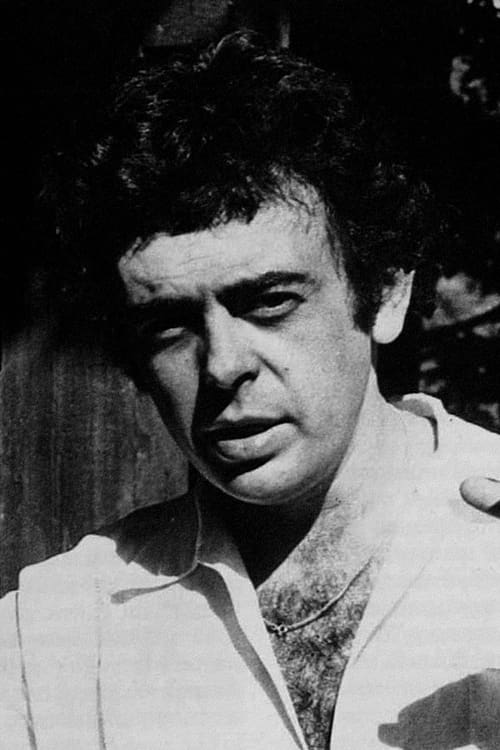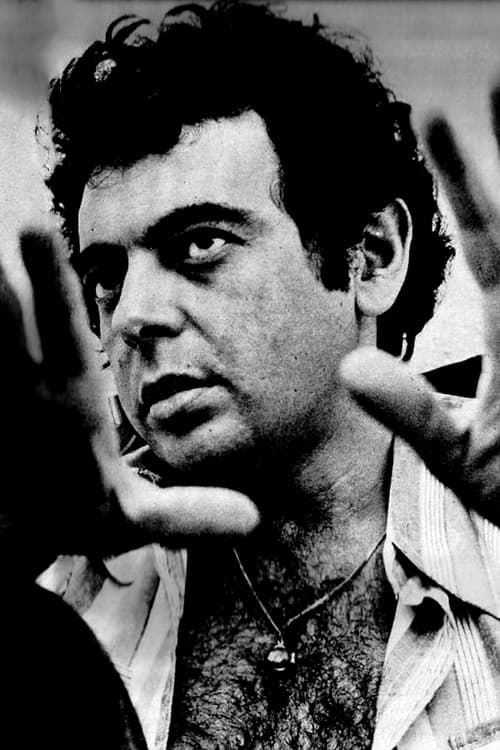
Himself
A final conversation with departed actor, director and musical producer Julio Calasso Jr., a key character in the Brazilian artistic scene. At his old house in Butantã, São Paulo, Julio talks about his experiences, frustrations, joys and tragedies.
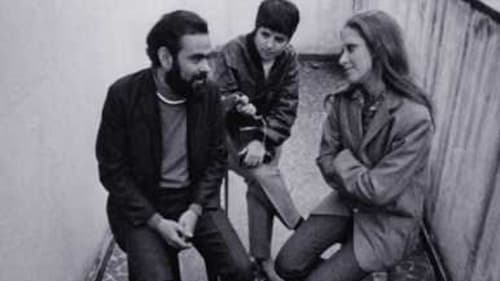
Self
An authentically marginal cinema created in Catholic university in Brazil. One of the most intriguing and imaginative moments in modern cinema in the voice of some of its select conspirators—with Carlos Reichenbach at the lead—, and through the most razing flow of images that can possibly be conceived.
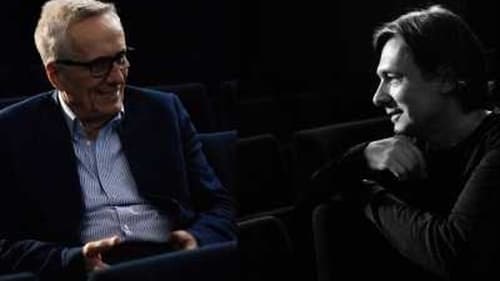
Self (archive footage)
A deep dive into Glauber Rocha's years exiled in Italy in the 70s. Through a collection of interviews and archives, the movie shows the making of his film Claro (1975) and his relation with European auteurs in their filmic and political views.
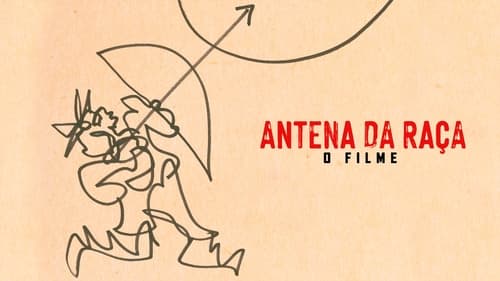
Self
The film comes to appropriate and re-discuss the Brazilian reality, based on the dialogues, excerpts and scenes from Glauber Rocha visceral films and his desire to "remove the masks", from ou third world saga. In this scenario where love and violence coexist in a state of inequality and often abandonment.

Self (archive footage)
A totally Cardoso-appropriated footage delirium, done as a tribute to US independent cinema's original rebel. In the end, Corman himself blesses Cardoso by saying: "You blended horror, sex and humour very well. And particularly the editing is very good because the film never lagged or slowed down". Which film? This one!

Self (archive footage)
Helena Ignez is one of the main female figures of Brazilian cinema. She developed a new style of acting. Nowadays, she directs independent films. The documentary tells some of the History of Brazilian cinema, its political context and Helena's trajectory.
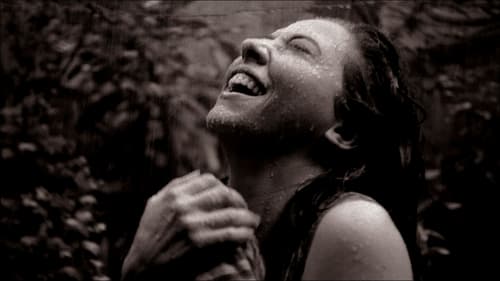
Self - Filmmaker (archive footage)
A deep investigation, in the way of a poetic essay, on one of the main Latin American movements in cinema, analyzed via the thoughts of its main authors, who invented, in the early 1960s, a new way of making movies in Brazil, with a political attitude, always near to people's problems, that combined art and revolution.

On April 25, 1974 the iconoclastic Brazilian filmmaker Glauber Rocha was in Portugal. There, he joined the collective collective film "As Armas e o Povo". With his foreign and peculiar look, he broke the rules of conventional filmmaking.

Self (archive footage)

Director of Photography
In 1973, during a trip to the city of Essaouira, in Morocco, Glauber Rocha and girlfriend Mossa Bildner took a Super 8 camera to register their impressions.

Himself
In 1973, during a trip to the city of Essaouira, in Morocco, Glauber Rocha and girlfriend Mossa Bildner took a Super 8 camera to register their impressions.

Ele mesmo

Documentary on the view, testimonies and times of Darcy Ribeiro, since military dictatorship.

Ele mesmo

Documentary about Der Leone Have Sept Cabeças

Using home movies and other media, a filmmaker returns to Sintra, Portugal to search for memories of her late husband, Brazilian filmmaker Glauber Rocha.

Documentary on "Antonio das Mortes", Glauber Rocha's 1969 film.

The documentary "Depois do Transe" covers the entire process of creating the masterpiece "Entranced Earth", which was released and awarded at the Cannes Film Festival in 1967. "Entranced Earth" charmed the world and won great admirers such as filmmaker Martim Scorsese and the writer Marguerite Duras, who at the time considered a "fabulous filmic opera."

Contemporary film critics regard the epic film I Am Cuba as a modern masterpiece. The 1964 Cuban/Soviet coproduction marked a watershed moment of cultural collaboration between two nations. Yet the film never found a mass audience, languishing for decades until its reintroduction as a "classic" in the 1990s. Vicente Ferraz explores the strange history of this cinematic tour de force, and the deeper meaning for those who participated in its creation.

Ele mesmo
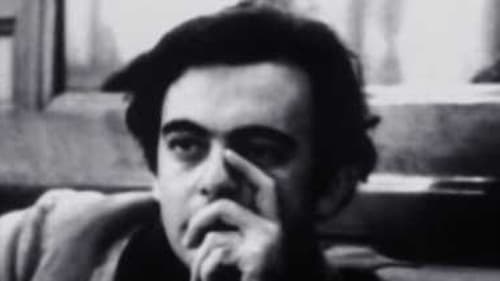
Documentary about Brazilian filmmaker Glauber Rocha, one of the most important names in the Cinema Novo, with interviews with some of his friends and colleagues.

Documentary about the relationship between filmmaker Glauber Rocha and Cuba.

Self
The Portuguese Revolution (1974-75) seen through the eyes of some of the most important photographers and filmmakers that witnessed the event. Their dreams and expectations and what came out of the revolution. With outstanding historical footage.


(voice)
Documentary that celebrates 100 years of cinema in Latin America and talks about the origins and the development of cinema in this subcontinent. Its structure is based in 12 short films directed by various Latin American directors. These are: 1) "Los inicios", Iván Trujillo 2) "Cuando comenzamos a hablar", María Novaro 3) "Jugando en serio", Jacobo Morales 4) "De cuerpo presente [Las espirales perpetuas del placer y el poder] Cine Mexicano [1931- 1997]", Marcela Fernández Violante 5) "Cuando quisimos ser adultos", Edmundo Aray and David Rodríguez 6) "Cinema Novo", Orlando Senna 7) "Memorias de una isla, Juan Carlos Tabío 8) "Un grito, 24 cuadros por segundo", Julio García-Espinosa 9) "El día de la independencia", Federico García 10) "¿Sólo las formas permanecen?", Fernando Birri and Pablo Rodríguez Gauregui 11) "Todo final es un principio", Andrés Marriquín.

A late-1960s interview with Brazilian filmmaker Glauber Rocha, mixed in avant-garde style with scenes from his films and clips from fellow filmmaker José Mojica Marins and visual artist Hélio Oiticica.

Writer
Four Third-World Christs try to stop the American industrialist John Brahms in Glauber Rocha's experimental film inspired by Pier Paolo Pasolini's murder.

Producer
Four Third-World Christs try to stop the American industrialist John Brahms in Glauber Rocha's experimental film inspired by Pier Paolo Pasolini's murder.

Ele mesmo
Four Third-World Christs try to stop the American industrialist John Brahms in Glauber Rocha's experimental film inspired by Pier Paolo Pasolini's murder.

Director
Four Third-World Christs try to stop the American industrialist John Brahms in Glauber Rocha's experimental film inspired by Pier Paolo Pasolini's murder.

Director
One of the most daring and radical shows presented in brazilian television: "Abertura". It was broadcasted between February and October, 1979 with weekly editions, presented by brazilian filmaker Glauber Rocha. The video is a compilation of characters, statements and interviews about the political and cultural situation of the country during the final stages of the Military Dictatorship.

Presenter
One of the most daring and radical shows presented in brazilian television: "Abertura". It was broadcasted between February and October, 1979 with weekly editions, presented by brazilian filmaker Glauber Rocha. The video is a compilation of characters, statements and interviews about the political and cultural situation of the country during the final stages of the Military Dictatorship.

Self (archive footage)
Explores the complex relationship between the spirit, body, and mind. The film is a nightmare with closed eyes because it counts among the most terrible moments of my life, my second exile, which lasted a very long time. Inspired by an ancient Hindu legend.

Jorjamado no Cinema foi feito para um programa de televisão consagrado ao escritor Jorge Amado. Nesse documentário, Jorge Amado é filmado em sua casa, rodeado por sua numerosa família; numa livraria, durante uma sessão de autógrafos de um de seus livros, em um cinema em Salvador, na avant-première do filme Tenda dos Milagres, de Nelson Pereira dos Santos, adaptação do livro homônimo de Jorge Amado. Glauber filma seu amigo com muito humor e carinho. A câmera vai evoluindo lentamente, sem cessar e com rapidez sobre o escritor, seus familiares, atores e atrizes do filme de Nelson, além de passar por objetos de rituais de candomblé que constituem o museu de Jorge Amado.

Director
Jorjamado no Cinema foi feito para um programa de televisão consagrado ao escritor Jorge Amado. Nesse documentário, Jorge Amado é filmado em sua casa, rodeado por sua numerosa família; numa livraria, durante uma sessão de autógrafos de um de seus livros, em um cinema em Salvador, na avant-première do filme Tenda dos Milagres, de Nelson Pereira dos Santos, adaptação do livro homônimo de Jorge Amado. Glauber filma seu amigo com muito humor e carinho. A câmera vai evoluindo lentamente, sem cessar e com rapidez sobre o escritor, seus familiares, atores e atrizes do filme de Nelson, além de passar por objetos de rituais de candomblé que constituem o museu de Jorge Amado.
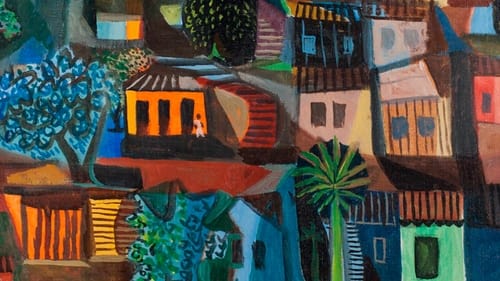
Narrator
This controversial film from director Glauber Rocha records the funeral of his friend, major Brazilian painter Emiliano Di Cavalcanti.

Director
This controversial film from director Glauber Rocha records the funeral of his friend, major Brazilian painter Emiliano Di Cavalcanti.

Documentary about Humberto Mauro, his work and its importance.
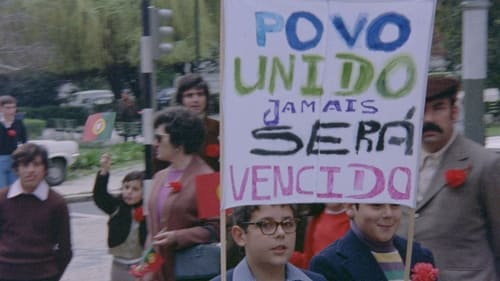
Director
Film directors with hand-held cameras went to the streets of Lisbon from April 25 to May 1, 1974, registering interviews and political events of the Portuguese "Carnations Revolution", as that period would be later known.

Producer
In the words of the director, a movie about 'the colonizers in the view of the colonized', the movie presents a series of disconnected happenings throughout Europe and Brazil emphasizing the perception of human life as trance-like experiences and thus offering a view of the human history as a connection of symbolic behavior.

In the words of the director, a movie about 'the colonizers in the view of the colonized', the movie presents a series of disconnected happenings throughout Europe and Brazil emphasizing the perception of human life as trance-like experiences and thus offering a view of the human history as a connection of symbolic behavior.

Himself
Film directors with hand-held cameras went to the streets of Lisbon from April 25 to May 1, 1974, registering interviews and political events of the Portuguese "Carnations Revolution", as that period would be later known.

Writer
In the words of the director, a movie about 'the colonizers in the view of the colonized', the movie presents a series of disconnected happenings throughout Europe and Brazil emphasizing the perception of human life as trance-like experiences and thus offering a view of the human history as a connection of symbolic behavior.

Director
In the words of the director, a movie about 'the colonizers in the view of the colonized', the movie presents a series of disconnected happenings throughout Europe and Brazil emphasizing the perception of human life as trance-like experiences and thus offering a view of the human history as a connection of symbolic behavior.

Writer
Filme de montagem realizado no exílio de 1971 a 1973 entre Cuba e Roma. É considerado um trabalho “semi-acabado” de Glauber que tem um certo caráter pedagógico e procura através de uma montagem dialética fazer uma revisão crítica da colonização, da luta de classes, do messianismo e da implantação dos governos populistas no Terceiro Mundo. Há uma cronologia nos fatos apresentados que, apoiados em vasta iconografia (filmes, gravuras, fotos,etc...) operam, contudo, associações “livres” que permitem ao espectador uma visão “polifônica” da “Hystorya do Brazyl”.

Director
Filme de montagem realizado no exílio de 1971 a 1973 entre Cuba e Roma. É considerado um trabalho “semi-acabado” de Glauber que tem um certo caráter pedagógico e procura através de uma montagem dialética fazer uma revisão crítica da colonização, da luta de classes, do messianismo e da implantação dos governos populistas no Terceiro Mundo. Há uma cronologia nos fatos apresentados que, apoiados em vasta iconografia (filmes, gravuras, fotos,etc...) operam, contudo, associações “livres” que permitem ao espectador uma visão “polifônica” da “Hystorya do Brazyl”.

Producer
This film shows people with constant psychological and social conflicts: the violence among outlaws, conflicts between man and woman, police and society.

Writer
This film shows people with constant psychological and social conflicts: the violence among outlaws, conflicts between man and woman, police and society.

Director
This film shows people with constant psychological and social conflicts: the violence among outlaws, conflicts between man and woman, police and society.

Expedito, after being abandoned by his parents, became Zefa's adopted son until he became a man and started earning his living as an independent fisherman. As soon as he finds out that Zefa is very ill, Expedito runs back home and finds his adoptive mother in agony. At the edge of the bed, a mysterious woman, who claims to be Death, sits.

Director
Expedito, after being abandoned by his parents, became Zefa's adopted son until he became a man and started earning his living as an independent fisherman. As soon as he finds out that Zefa is very ill, Expedito runs back home and finds his adoptive mother in agony. At the edge of the bed, a mysterious woman, who claims to be Death, sits.
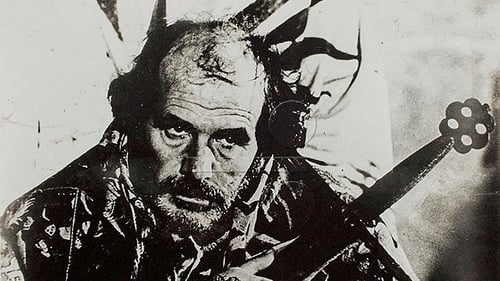
Screenstory
In a castle, somewhere in the Thirld World, Diaz is delirious, dreaming of the power he had in Eldorado, while oppressing the indians, workers and peasants. He is well aware of the menace his old victims represent, while a miracle-making shepherd fascinates and frightens him. Diaz finds a countrywoman, symbol of purity, and prepares a ceremony in his castle resembling his own funeral. - IMDb

Director
In a castle, somewhere in the Thirld World, Diaz is delirious, dreaming of the power he had in Eldorado, while oppressing the indians, workers and peasants. He is well aware of the menace his old victims represent, while a miracle-making shepherd fascinates and frightens him. Diaz finds a countrywoman, symbol of purity, and prepares a ceremony in his castle resembling his own funeral. - IMDb
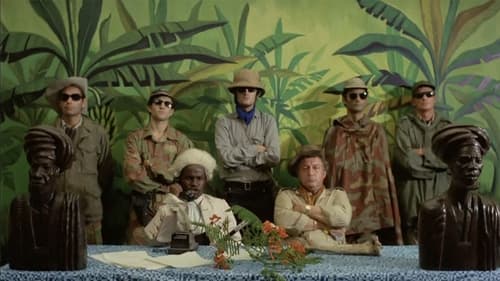
Editor
A white-robed preacher wanders and sermonizes across African lands; European communists and CIA spies conspire out of mutual self-interest to engineer the appointment of an African bourgeois to a puppet government presidency; and a revolutionary group marches in exile.

Screenplay
A white-robed preacher wanders and sermonizes across African lands; European communists and CIA spies conspire out of mutual self-interest to engineer the appointment of an African bourgeois to a puppet government presidency; and a revolutionary group marches in exile.

「勝手にしやがれ」のゴダール監督が、フランスの5月革命の終結後、創造集団“ジガ・ヴェルトフ集団”の作品として製作し、実験的な試みがなされた前衛的作品。イタリア語でしゃべる騎兵隊の将官、彼に暴行されるインディアンの青年、インディアンの監察官、娼婦らが登場し、西部劇の設定を借りて階級闘争と民主主義の勝利が語られる。(allcinema)

Director
A white-robed preacher wanders and sermonizes across African lands; European communists and CIA spies conspire out of mutual self-interest to engineer the appointment of an African bourgeois to a puppet government presidency; and a revolutionary group marches in exile.

Él mismo
The making of Cabezas Cortadas.

Self
Through folklore manifestations and diverse artistic expressions, the film is a document that exalts and honors the Bahian culture.

Producer
Year 2000. Brazil was partially devastated by the Third World War. An immigrant family arrives in a small town, which they call "I Forgot." The trio is recruited by an indigenist to pretend to be indigenous during the visit of a general. In the dilemma of integrating into the system or preserving individual freedom, the family moves toward disintegration as the city prepares to launch a space rocket.
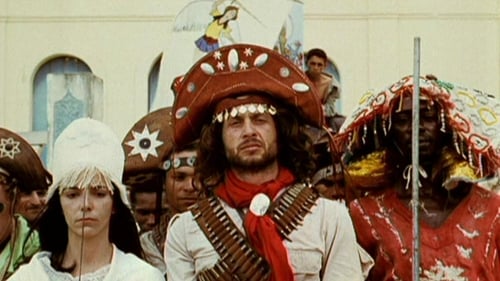
Production Design
A new incarnation of Cangaceiro bandits, led by Coirana, has risen in the badlands. A blind landowner hires Antônio to wipe out his old nemesis. Yet after besting Coirana and accompanying the dying man to his mountain hideout, Antônio is moved by the plight of the Cangaceiro’s followers. The troubled hitman turns revolutionary, his gun and machete aimed towards his former masters.

Producer
A new incarnation of Cangaceiro bandits, led by Coirana, has risen in the badlands. A blind landowner hires Antônio to wipe out his old nemesis. Yet after besting Coirana and accompanying the dying man to his mountain hideout, Antônio is moved by the plight of the Cangaceiro’s followers. The troubled hitman turns revolutionary, his gun and machete aimed towards his former masters.

Screenplay
A new incarnation of Cangaceiro bandits, led by Coirana, has risen in the badlands. A blind landowner hires Antônio to wipe out his old nemesis. Yet after besting Coirana and accompanying the dying man to his mountain hideout, Antônio is moved by the plight of the Cangaceiro’s followers. The troubled hitman turns revolutionary, his gun and machete aimed towards his former masters.

Director
A new incarnation of Cangaceiro bandits, led by Coirana, has risen in the badlands. A blind landowner hires Antônio to wipe out his old nemesis. Yet after besting Coirana and accompanying the dying man to his mountain hideout, Antônio is moved by the plight of the Cangaceiro’s followers. The troubled hitman turns revolutionary, his gun and machete aimed towards his former masters.

Director
Unfinished documentary about the "March of the 100,000", driven by the student movement against brazilian dictatorship in 1968. Glauber directed with "Antonio das Mortes'" cinematographer, Affonso Beatto. A mysterious film.

Story
Chronicles the life of a 17 year-old girl living in the upper-class Rio de Janeiro neighbourhood of Ipanema. Márcia lives a life of parties and spend her days among bohemians, musicians and intellectuals. While seeming happy in the outside, she's extremely anguished inside. Based on the famous song by Antonio Carlos Jobim and Vinicius de Moraes.
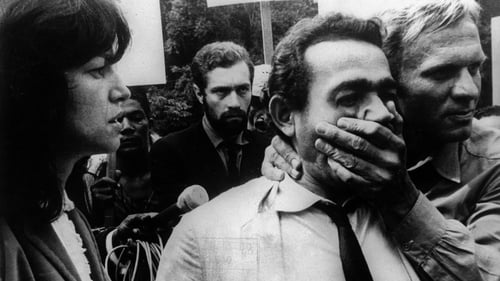
Producer
Eldorado, a fictitious country in America, is sparkling with the internal struggle for political power. In the eye of this social convulsion, the jaded journalist Paulo Martins opposes two equally corrupt political candidates: a pseudopopulist and a conservative. In this context, Paulo is torn between the madness of the elite and the blind submission of the masses. But, in this complex tropical reality, nothing really is what it seems to be.

Screenplay
Eldorado, a fictitious country in America, is sparkling with the internal struggle for political power. In the eye of this social convulsion, the jaded journalist Paulo Martins opposes two equally corrupt political candidates: a pseudopopulist and a conservative. In this context, Paulo is torn between the madness of the elite and the blind submission of the masses. But, in this complex tropical reality, nothing really is what it seems to be.

Director
Eldorado, a fictitious country in America, is sparkling with the internal struggle for political power. In the eye of this social convulsion, the jaded journalist Paulo Martins opposes two equally corrupt political candidates: a pseudopopulist and a conservative. In this context, Paulo is torn between the madness of the elite and the blind submission of the masses. But, in this complex tropical reality, nothing really is what it seems to be.

Himself
Originally produced for German TV, Improvised and Purposeful is a firsthand look at the "Cinema Novo" movement (otherwise known as the 'Brazilian New Wave'). Director Joaquim Pedro de Andrade focuses on six Cinema Novo filmmakers working in Rio in 1967.
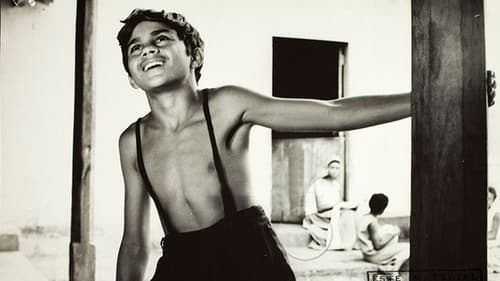
Producer
After being orphaned, a boy is raised by his grandfather and uncles, rich rural landowners, on a sugarcane plantation where he grows up, studies, learns about politics, love and disillusionment.
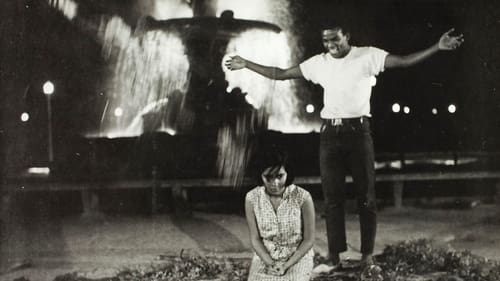
Producer
In search of a better life, Luzia leaves the Northeast of Brazil and goes to Rio de Janeiro, looking for her fiance who went first to pave their way. Alone in the Marvelous City, she is forced to accept the friendship and protection of Calunga and, later, the company of Inácio.

Writer
A brief look at Amazonas, its population, their costumes, the rich nature and its importance to Brazil and the world.

Director
A brief look at Amazonas, its population, their costumes, the rich nature and its importance to Brazil and the world.

Director
A report on Sarney's inauguration as the governor of the Maranhão state. His promises are heard alongside images of the grim reality.
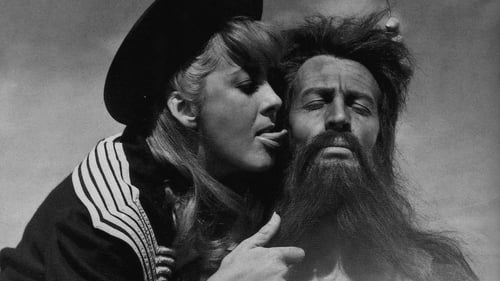
Man in nightclub
Simon, a deeply religious man living in the 4th century, wants to be nearer to God so he climbs a column. The Devil wants him come down to Earth and is trying to seduce him.
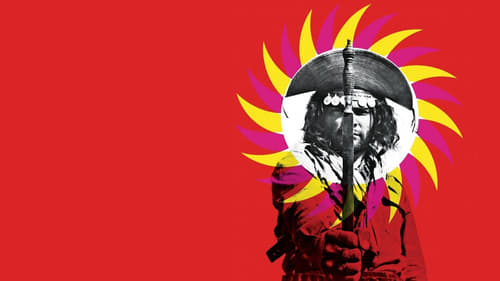
Associate Producer
Wanted for killing his boss, Manuel flees with his wife Rosa to the sertão, the barren landscape of Northern Brazil. Thrust into a primordial violent region, Manuel and Rosa come under the influence and control of a series of frightening figures.

Writer
Wanted for killing his boss, Manuel flees with his wife Rosa to the sertão, the barren landscape of Northern Brazil. Thrust into a primordial violent region, Manuel and Rosa come under the influence and control of a series of frightening figures.

Director
Wanted for killing his boss, Manuel flees with his wife Rosa to the sertão, the barren landscape of Northern Brazil. Thrust into a primordial violent region, Manuel and Rosa come under the influence and control of a series of frightening figures.

Director
In Bahia, an educated black man returns to his home fishing village to try and free people from mysticism, in particular the Candomblé religion, which he considers a factor of political and social oppression, with tragic outcome.

Screenplay
In Bahia, an educated black man returns to his home fishing village to try and free people from mysticism, in particular the Candomblé religion, which he considers a factor of political and social oppression, with tragic outcome.

Production Manager
The psychology and life of Brazilian hitmen, common in the Northeast part of the country. In this particular case, the story revolves around a young and idealistic politician from Salvador, whom the enemies are eager to eliminate.

Homem empurrando mulher
Made in the famous "Água de Meninos" market, the greatest popular market in Salvador, Bahia, Brazil. Salvador is revealed without prejudices, from the world of high finance up to the sordid environment of exotic cabarets.

Executive Producer
Made in the famous "Água de Meninos" market, the greatest popular market in Salvador, Bahia, Brazil. Salvador is revealed without prejudices, from the world of high finance up to the sordid environment of exotic cabarets.

Director
Short film. Lost.

Producer
A man and a woman are laying on a chess-like patio. Both are trying to reach each other in the best way they can. However, for some odd reason they don't get on their feet, they don't talk to each other, and the only sounds heard are voices coming from a radio and strange sounds that seem to indicate something's about to happen.

Writer
A man and a woman are laying on a chess-like patio. Both are trying to reach each other in the best way they can. However, for some odd reason they don't get on their feet, they don't talk to each other, and the only sounds heard are voices coming from a radio and strange sounds that seem to indicate something's about to happen.

Director
A man and a woman are laying on a chess-like patio. Both are trying to reach each other in the best way they can. However, for some odd reason they don't get on their feet, they don't talk to each other, and the only sounds heard are voices coming from a radio and strange sounds that seem to indicate something's about to happen.

An experimental, visual poem that registers life and the architecture of Sintra (Portugal), captured by Paula Gaitán and featuring glimpses into her own photography art, rural/urban contrast, and memories with Glauber Rocha and family. Accompanied by the soundwork and music of L. Borgia Rossetti.
